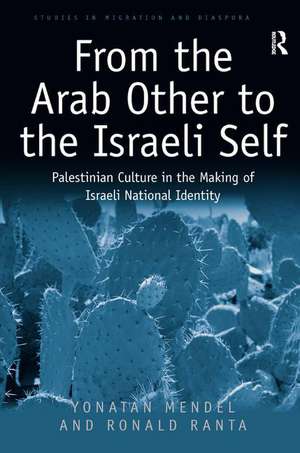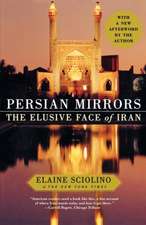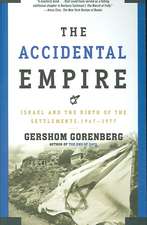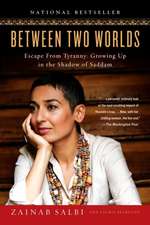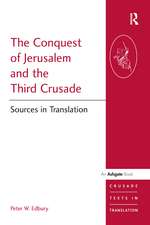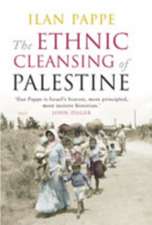From the Arab Other to the Israeli Self: Palestinian Culture in the Making of Israeli National Identity: Studies in Migration and Diaspora
Autor Yonatan Mendel, Ronald Rantaen Limba Engleză Hardback – 7 apr 2016
Based on extensive and original primary sources, including archival research, memoirs, advertisements, cookbooks and a variety of cultural products – from songs to dance steps – From the Arab Other to the Israeli Self sheds light on an important cultural and ideational diffusion that has occurred between the Zionist settlers – and later the Jewish-Israeli population – and the indigenous Arab-Palestinian people in Historical Palestine. By examining Israeli food culture, national symbols, the Modern Hebrew language spoken in Israel, and culture, the authors trace the journey of Israeli national identity and culture, in which Arab-Palestinian culture has been imitated, adapted and celebrated, but strikingly also rejected, forgotten and denied. Innovative in approach and richly illustrated with empirical material, this book will appeal to sociologists, anthropologists, historians and scholars of cultural and Middle Eastern studies with interests in the development and adaptation of culture, national thought and identity.
| Toate formatele și edițiile | Preț | Express |
|---|---|---|
| Paperback (1) | 239.06 lei 6-8 săpt. | |
| Taylor & Francis – 14 aug 2018 | 239.06 lei 6-8 săpt. | |
| Hardback (1) | 819.09 lei 6-8 săpt. | |
| Taylor & Francis – 7 apr 2016 | 819.09 lei 6-8 săpt. |
Din seria Studies in Migration and Diaspora
- 8%
 Preț: 383.57 lei
Preț: 383.57 lei - 30%
 Preț: 846.53 lei
Preț: 846.53 lei - 14%
 Preț: 338.33 lei
Preț: 338.33 lei - 31%
 Preț: 767.20 lei
Preț: 767.20 lei - 16%
 Preț: 216.07 lei
Preț: 216.07 lei - 31%
 Preț: 766.31 lei
Preț: 766.31 lei - 25%
 Preț: 767.01 lei
Preț: 767.01 lei -
 Preț: 469.34 lei
Preț: 469.34 lei - 18%
 Preț: 1061.06 lei
Preț: 1061.06 lei - 18%
 Preț: 1000.27 lei
Preț: 1000.27 lei - 31%
 Preț: 767.01 lei
Preț: 767.01 lei -
 Preț: 323.23 lei
Preț: 323.23 lei -
 Preț: 489.26 lei
Preț: 489.26 lei -
 Preț: 469.34 lei
Preț: 469.34 lei - 13%
 Preț: 338.33 lei
Preț: 338.33 lei - 28%
 Preț: 820.71 lei
Preț: 820.71 lei - 18%
 Preț: 1000.27 lei
Preț: 1000.27 lei - 12%
 Preț: 299.52 lei
Preț: 299.52 lei - 25%
 Preț: 824.70 lei
Preț: 824.70 lei - 26%
 Preț: 763.61 lei
Preț: 763.61 lei - 14%
 Preț: 337.88 lei
Preț: 337.88 lei - 18%
 Preț: 1000.27 lei
Preț: 1000.27 lei - 24%
 Preț: 322.92 lei
Preț: 322.92 lei -
 Preț: 469.34 lei
Preț: 469.34 lei -
 Preț: 489.26 lei
Preț: 489.26 lei - 18%
 Preț: 1057.89 lei
Preț: 1057.89 lei -
 Preț: 469.34 lei
Preț: 469.34 lei - 31%
 Preț: 764.69 lei
Preț: 764.69 lei - 13%
 Preț: 338.33 lei
Preț: 338.33 lei - 18%
 Preț: 1000.27 lei
Preț: 1000.27 lei - 26%
 Preț: 819.09 lei
Preț: 819.09 lei - 18%
 Preț: 1109.99 lei
Preț: 1109.99 lei - 18%
 Preț: 1054.71 lei
Preț: 1054.71 lei - 18%
 Preț: 1001.84 lei
Preț: 1001.84 lei - 18%
 Preț: 1054.71 lei
Preț: 1054.71 lei
Preț: 819.09 lei
Preț vechi: 1102.30 lei
-26% Nou
Puncte Express: 1229
Preț estimativ în valută:
156.73€ • 163.64$ • 129.72£
156.73€ • 163.64$ • 129.72£
Carte tipărită la comandă
Livrare economică 04-18 aprilie
Preluare comenzi: 021 569.72.76
Specificații
ISBN-13: 9781472449351
ISBN-10: 1472449355
Pagini: 188
Ilustrații: Includes 17 b&w illustrations
Dimensiuni: 156 x 234 x 19 mm
Greutate: 0.41 kg
Ediția:New ed
Editura: Taylor & Francis
Colecția Routledge
Seria Studies in Migration and Diaspora
Locul publicării:Oxford, United Kingdom
ISBN-10: 1472449355
Pagini: 188
Ilustrații: Includes 17 b&w illustrations
Dimensiuni: 156 x 234 x 19 mm
Greutate: 0.41 kg
Ediția:New ed
Editura: Taylor & Francis
Colecția Routledge
Seria Studies in Migration and Diaspora
Locul publicării:Oxford, United Kingdom
Cuprins
Foreword
Introduction
1. How do you say Arabic in Hebrew? Hebrew’s modern ‘revival’ and the place of Arabic
2. What’s in a symbol? Deconstructing Israeli national symbols
3. Digesting the nation: Arab ingredients in the making of the ‘Israeli kitchen’
4. The creation of an Arab non-Arab culture: between the Arab other and the Israeli self
Conclusion
Bibliography
Index
Introduction
1. How do you say Arabic in Hebrew? Hebrew’s modern ‘revival’ and the place of Arabic
2. What’s in a symbol? Deconstructing Israeli national symbols
3. Digesting the nation: Arab ingredients in the making of the ‘Israeli kitchen’
4. The creation of an Arab non-Arab culture: between the Arab other and the Israeli self
Conclusion
Bibliography
Index
Notă biografică
Yonatan Mendel is a researcher at the Rosenzweig Minerva Research Center at the Hebrew University of Jerusalem, Israel and Research Associate at the Centre of Islamic Studies at the University of Cambridge, UK. He also serves as the Director of Projects of the Mediterranean Unit at the Van Leer Jerusalem Institute, Israel. He is the author of The Creation of Israeli Arabic: Political and Security Considerations in the Making of Arabic Language Studies in Israel.
Ronald Ranta is a Lecturer in Politics, International Relations and Human Rights at Kingston University and Honorary Research Associate at UCL where he teaches a course on Israel and the Occupied Territories. He is the author of Political Decisions Making and Non Decision: The Case of Israel and the Occupied Territories, and co-author of Food, National Identity and Nationalism: From Everyday to Global Politics.
Ronald Ranta is a Lecturer in Politics, International Relations and Human Rights at Kingston University and Honorary Research Associate at UCL where he teaches a course on Israel and the Occupied Territories. He is the author of Political Decisions Making and Non Decision: The Case of Israel and the Occupied Territories, and co-author of Food, National Identity and Nationalism: From Everyday to Global Politics.
Recenzii
‘From the Arab Other to the Israeli Self provides a pathbreaking, probing and critical look into the processes of mobilization and articulation of elements of Palestinian culture in the construction of Israeli identity. This is an accessible, yet insightful and thought-provoking contribution to an under-researched area that I unreservedly recommend to anyone who wants to understand the complexity of identity politics in this contested land.’ Spyros A. Sofos, Lund University, Sweden
Descriere
This book examines the role played by Arab-Palestinian culture and people in the construction and reproduction of Israeli national identity and culture, showing that it is impossible to understand modern Israeli national identity and culture without taking into account its crucial encounter and dialectical relationship with the Arab-Palestinian indigenous 'Other'. By examining Israeli food culture, national symbols, the Modern Hebrew language spoken in Israel, and culture, the authors trace the journey of Israeli national identity and culture, in which Arab-Palestinian culture has been imitated, adapted and celebrated, but strikingly also rejected, forgotten and denied.
